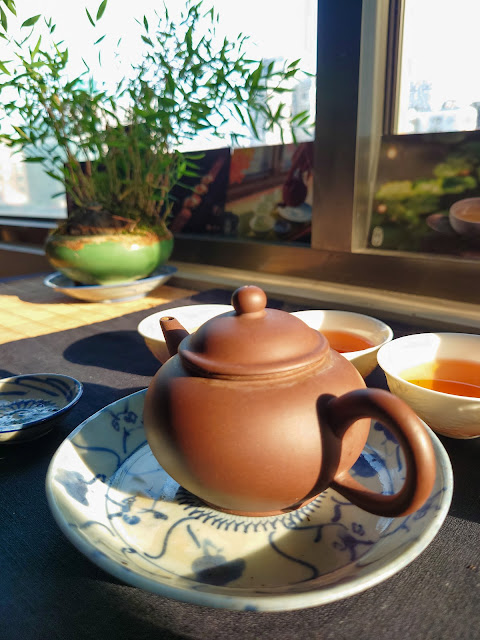 |
| 2008 raw Banzhang gushu puerh |
First, let's acknowledge that man is both capable of cooperation for the good and for the bad. Our Paleolithic ancestors would hunt animals in groups to feed the tribe, but they could apply the same group hunting techniques to make war on other tribes. They could also barter, trade between tribes. Others were not necessarily enemies. They could become allies, additions to the family (through mating/marriage...) However, for most of its history, man played a zero sum game. When it comes to food, land, water, natural resources... what belongs to A doesn't belong to B. This made competition and conflict more likely.
The good news is that the knowledge economy isn't based on physical goods anymore. It's based on knowledge, mostly bits and bytes in computer systems. They can be reproduced almost infinitely at almost no cost. In this new economy, man plays a game with positive outcomes. Unlike land or food, when we share our knowledge, we don't become poorer, but the person who receives it becomes richer!
This changes the dynamics of human interactions! Of course, the prerequisite is that basic needs are already covered. However, for advanced countries, this paradigm shift means that cooperation will make more sense than hostility.
But the knowledge economy is also partially at work in lots of products that demand a lot of R&D. Because the more these innovative companies can sell worldwide, the more money they can spend on R&D. Smartphones are a good example. The cost of the raw material is low. What costs a lot is the R&D behind the latest chip design and manufacturing. But this cost is fixed and the more people purchase the phone, the cheaper it can become.
Tea is also, in part, a new economy product. Why?
The good news is that the knowledge economy isn't based on physical goods anymore. It's based on knowledge, mostly bits and bytes in computer systems. They can be reproduced almost infinitely at almost no cost. In this new economy, man plays a game with positive outcomes. Unlike land or food, when we share our knowledge, we don't become poorer, but the person who receives it becomes richer!
This changes the dynamics of human interactions! Of course, the prerequisite is that basic needs are already covered. However, for advanced countries, this paradigm shift means that cooperation will make more sense than hostility.
But the knowledge economy is also partially at work in lots of products that demand a lot of R&D. Because the more these innovative companies can sell worldwide, the more money they can spend on R&D. Smartphones are a good example. The cost of the raw material is low. What costs a lot is the R&D behind the latest chip design and manufacturing. But this cost is fixed and the more people purchase the phone, the cheaper it can become.
Tea is also, in part, a new economy product. Why?
Because it's incomplete. Tea requires brewing to fulfill its purpose of becoming a beverage.
We have 2 cases:
1. The customer doesn't know how to brew the leaves he has purchased. He's therefore likely to make lots of mistakes when brewing the tea (no attention to the water, to the kettle, to the temperature, no preheating, poor choice of tea vessel, tea cups...). A lack of information about the plantation, the process, the character of the tea... might also lead to a lack of understanding on how to get the most out of the leaves.
2. The tea will taste much better if the seller educates his customer and teaches how to brew using either a gaiwan or a dedicated Yixing teapot (and which is most suitable). He will also help make the experience more meaningful if he gives important information about the character of the mountain, the management style of the farmer, the date of harvest... Now, thanks to YouTube, I can even make videos to show you how I brew my teas! All this information doesn't make me, the seller poorer, and it helps the customer increase the satisfaction from his tea.
Note: also remember the principle 'Garbage in, garbage out.'! The more the knowledge matters, the more it's important to find a source one can trust, and to build up your own knowledge to verify it). If the story is too good to be true...
I hope that you see why I'm confident for the future. Knowledge is key to leading a meaningful and high quality life. And sharing this knowledge makes the world richer while not taking anything away from us! By the way, this summer, I will contact the customer with the highest order each week and offer to interact with my on a video call. This will be an opportunity to help improve your technique, discuss the tea challenges you might have or talk about your tea way in general. I am looking forward providing this free service to the customers who trust in the quality of the teas I have selected for a 20th times this year!















No comments:
Post a Comment